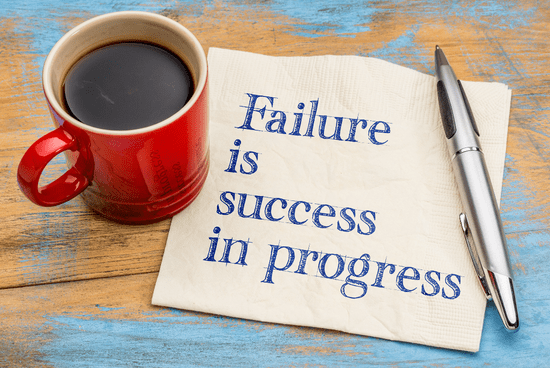Implementation Leadership Principle 5: Fail Forward, Fail Often
January 12, 2023 – This article is one in a series of articles about ACJI’s 10 Essential Principles of Implementation Leadership. If you’re new here, take a look at our first article in the series on principle 1 to start.
Effective change leadership in any organization (not only in criminal justice and community reentry spaces) requires abundant and explicit permission for all its staff members to fail. Because, after all, healthy failure is an important part of human and organizational learning.
Think for a minute about your current organizational culture. Imagine the words RISK, FAILURE, TRIAL and ERROR. Are those words welcome or forbidden in the workplace? Are those words threatening or inviting?
What If Failure Was Encouraged?
If you want your employees to take risks, stretch outside of their comfort zones, and try new things, then risk, failure, and trial and error need welcomed support from leadership. As a change leader, what if you don’t just give permission to fail? What if you make failure an expectation?
Imagine an organization with a culture committed to excellence that makes it comfortable for people to fail as they learn. Leadership talks to staff regularly about the importance of their failures and makes an inventory of the learning that occurred in the process.
This is what ACJI likes to call failing forward. (A term coined by John Maxwell.)

What Failing Forward Looks Like In A Justice Agency Or Reentry Org
Learn In Public
Create space in meetings to discuss the failures and challenges that people are currently facing. This is an opportunity to say “I don’t know” out loud and hear other voices and perspectives.
Resist Saying, ‘We’ve Already Tried That’
When you say, “We tried that and it didn’t work,” you have to wonder why the idea is coming up again. It likely has some merit. Perhaps you just need to parse the good from the bad.
Encourage Risk-Taking
Encourage staff to try their innovative ideas in small, experimental ways and report back on what they learn.
Publish The Words ‘Fail Forward’
Make it so you see the words “fail forward” on your office wall, screen saver, and business cards. (Well, maybe not your business cards, but you get the idea.) Make the failing forward concept part of your daily consciousness.
After Action Reviewing (AAR)
AARs are used most often in the military. It’s about taking the time to reflect on and learn from actions to see what needs to start, stop, and continue. Most beta ideas need revisions, support, and adjustments. Heck, most old ideas need this, too.
An after-action review brings your team together to ask the following questions without judgment or blame. The more you do it, the easier it is to get and give feedback on your team. AAR questions are:
- What was supposed to happen?
- What happened?
- What did we learn?
- What will we apply or what changes will we make moving forward?
What Happens When Failure Is Discouraged?
When you punish and prohibit failure, you create a culture that is inhospitable to change. You may unintentionally be rewarding the status quo. If people do not have explicit psychological safety to learn, then the organization itself will not learn.
When you discourage failure, a natural part of work and life, you can actually create situations where people feel they need to withhold or hide information to keep their failures out of view. This can create organizational cultures filled with insecurity and finger pointing.
But What About…
It’s true. Not all things in a justice agency are up for trial and error, especially in situations where safety and the law are involved. The first step is to identify what your organization’s non-negotiables are and revisit those with intention once or twice a year to ensure they are still getting you the results you want. For everything else, let people imagine better ways to do their work and see what they come up with.
(Stay tuned for more information on what we mean by non-negotiables.)
To Sum Up
The most profound learning we experience is often preceded by failure. If we fear failure, we ultimately fear learning. If we fear learning, we fear change. If we fear change, we become irrelevant.
Real change occurs when failure and change are synonymous rather than in competition. And if this isn’t reason enough for those working in the criminal justice system to fail forward, we don’t know what is.
If you are a criminal legal system leader, be sure to read our next article on Principle 6: Fail Forward, Fail Often. You can also learn more about the 10 Essential Principles of Implementation Leadership in ACJI’s upcoming Academy where we talk about all 10 of the principles in much more depth.





